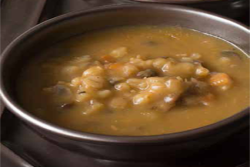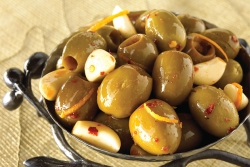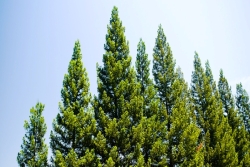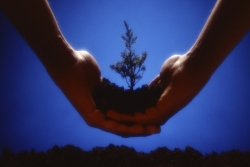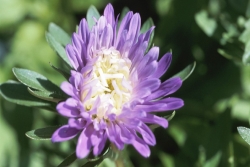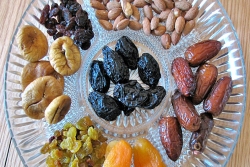Date-Fig Bars
This recipe is adapted from the King Arthur Flour Cookie Companion's recipe for Bakery Date Squares.
Vegetarian Mushroom Barley Soup
One favorite dish of the Ashkenazim that survived the move from the shtetl to North America was the hearty mushroom-potato-barley soup called krupnick.
Marinated Olives
A Unique Tu BiShvat for Israel's Trees
Jewish communities around the world marked the "new year for the trees" last week with tree planting ceremonies and seders that celebrate Israel's seven species (wheat, barley, grapes, figs, pomegranates, olives and dates if you are keeping track!).
Tu BiShvat: Happy Birthday, You Beautiful Trees!
My commute to work every morning is not typical. I drive through the Roaring Fork Valley with majestic, now snow-covered, mountains on my left and my right. The sky is often a clear, bright blue, and the sun glimmers off the powdery snow that shifts in the wind. I am the cantor at the Aspen Jewish Congregation, and I certainly feel blessed to live and work in such a beautiful place. This quote from Isaiah is particularly fitting for this part of the country, as the people here are very in touch with the nature around them - often finding their spiritual center while skiing a run or hiking in the hills.
In Honor of Tu BiShvat, Some Facts About Trees
Tu BiShvat, the birthday of the trees (or the new year of the trees) is a minor Jewish holiday.
At Tu BiShvat, Digging for Spiritual Growth
While my neighbors were putting their Christmas trees to the curb, in what seems like a ritual of replacement, I was preparing to plant for Tu BiShvat.
Those Who Plant Will Reap: A Tu BiShvat Lesson
Tu BiShvat is a reminder that we spend our lives planting seeds. Time and effort are needed for our efforts to bear fruit. Wait patiently. One day, like the seed, we will be blessed.
Planting a Seed
By Joshua Weinberg
“And when you come into the Land, and have planted all manner of food bearing trees… (Lev. 19:23) The Holy one Blessed be he said to the people Israel: Even though you have found [the land] full of plenty, you shall not say: We shall sit and not plant, rather proceed with caution in your planting… For as you have entered and found the fruits of others’ labor, you so shall plant for your children. (Midrash Tanhuma)
If you’re like me, then you may remember that pivotal moment of Jewish education when you received your very own Jewish National Fund (JNF) certificate for a tree planted in Israel. Whether it was for a birth, birthday, bar/bat mitzvah, or in memory of a loved one, a tree was planted in Israel to mark the occasion. The message was clear: with every passing milestone we want to connect Jews to the Land of Israel and to the Zionist enterprise. All of us who were the fortunate recipients of such trees knew in the recesses of our mind that somewhere in that strip of land, in some forest, was our tree, our little piece of Israel. As the certificates read, the JNF wished us the following: “We wish you the fortune of seeing it grow with much pleasure and ease.”
I am familiar with a Passover seder, but what is a Tu BiShvat seder?
Tu BiShvat (Hebrew for the 15th day of the Hebrew month of Shvat) is the new year of the trees.

